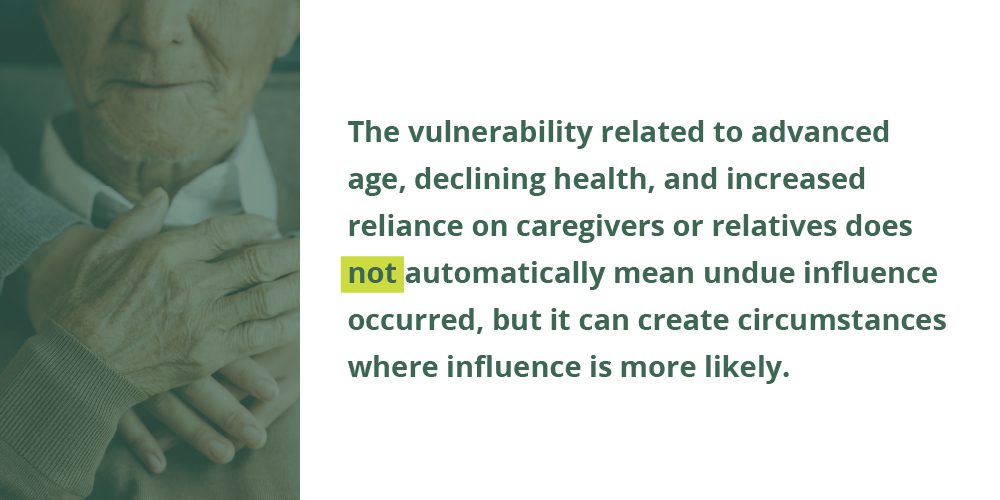What Is Undue Influence in Illinois Will Contests?

Challenging the validity of a will often involves allegations that someone manipulated the testator into changing their estate plan. In Illinois, undue influence is one of the most frequently cited grounds in will contests. Courts take these claims seriously because they call into question whether the testator’s final wishes were truly their own.
Understanding how undue influence works under Illinois law, what evidence courts consider, and how to file or defend against such a claim is critical if you are involved in a probate dispute. If you are defending yourself against a dispute over a will, or you are wondering whether initiating a dispute would be worth your time, contact our Naperville, IL probate law attorney.
What Does Undue Influence Mean Under Illinois Law?
Illinois courts define undue influence as “any improper urgency of persuasion whereby the will of a person is overpowered and he or she is induced to do that which he or she would not have done if left to act freely.” This definition, first articulated in cases such as Franciscan Sisters Health Care Corp. v. Dean, means that undue influence is influence that must overcome the free agency of the will’s creator and cause them to execute a will that does not reflect their true intent.
Undue influence often involves subtle psychological pressure rather than explicit threats or force. For example, a caregiver might isolate an elderly person from their family and suggest that certain relatives do not care about them, slowly persuading the testator to leave most of their estate to the caregiver. Other times, someone with great responsibility, like an attorney, might take advantage of a suggestible individual at a vulnerable time.
How Does the Court Evaluate Undue Influence Claims?
In Illinois, the party who wants to contest a will bears the burden of proving undue influence. To evaluate a claim, a court will look at the evidence surrounding each case. Some of the things they will look for include:
- Whether the decedent was isolated from others
- Whether the person alleged to wield undue influence was actively involved in finding an attorney to execute a will that gave them benefits
- Whether the decedent had independent advice from a neutral third party
- Whether there are discrepancies between the will and what the decedent previously expressed regarding their wishes
- Whether there are suspicious circumstances, such as secrecy around the will’s execution, pressure on the decedent to quickly take action, or discussions at inappropriate times
- Any other signs that untoward behavior took place
What Is a Fiduciary or Confidential Relationship?
Illinois courts recognize that certain relationships create a presumption of trust and confidence, including parents and children; attorneys and clients; and caregivers and patients. When there is a fiduciary relationship, the burden shifts to the fiduciary to prove that the testator acted voluntarily and with full knowledge. This shift is critical because it means the alleged influencer must present clear and convincing evidence that the will was not the product of undue influence.
Are Older Adults Especially Vulnerable to Undue Influence?
Many undue influence cases involve older adults with declining health and increased reliance on caregivers or family members. This vulnerability does not automatically mean undue influence occurred, but it can create circumstances where influence is more likely. Family members whose loved ones changed their will unexpectedly shortly before dying may have reasonable suspicions about such cases. Courts are careful to distinguish between legitimate caregiving relationships and those that cross into manipulation.

What Evidence Supports an Undue Influence Claim?
Proving undue influence requires a careful review of both direct and circumstantial evidence. Courts consider factors such as:
- The testator’s physical and mental health: Was the testator suffering from dementia, Alzheimer’s disease, or other cognitive impairments that increased susceptibility to influence?
- The influencer’s involvement in creating the will: Did the influencer hire the attorney, attend meetings, or direct the attorney’s drafting of provisions? Were these meetings done urgently or in secret?
- Unnatural or unexpected dispositions: Does the will exclude close family members without explanation or leave a disproportionate share of the estate to one person?
- Isolation of the testator: Was the testator cut off from friends and family, leaving them dependent on the influencer?
For example, if there was an elderly woman who revised her will to leave the entire estate to a caregiver who had isolated her from her children and controlled her finances, the court may presume undue influence and require the caregiver – not the woman’s children – to prove that undue influence was not a factor in the will’s execution.
Filing a Will Contest Based on Undue Influence
Under the Illinois Probate Act of 1975 (755 ILCS 5/8-1), a will contest must be filed within six months after the will has been admitted to probate. This deadline is strictly enforced. If you miss it, you will likely lose the ability to challenge the will on any grounds, including undue influence.
The complaint must clearly state the grounds for contesting the will and present supporting evidence. Illinois courts require clear and convincing proof of undue influence, which is a higher burden than the “preponderance of the evidence” standard used in most civil cases.
Defending Against an Undue Influence Claim
Defending a will against allegations of undue influence requires showing that the testator acted freely and with a clear understanding of their decisions. Evidence of independence during the estate planning process can be critical.
For example, testimony from the drafting attorney about private conversations with the testator can show that no one else was directing or controlling the testator’s choices. Medical records documenting the testator’s mental capacity at the time the will was signed may also help rebut claims of vulnerability or coercion.
In addition, showing that the testator maintained regular contact with family and friends and made consistent statements about their wishes can undermine arguments that they were isolated or manipulated. By establishing that the testator’s estate plan reflected their long-held intentions, it is possible to counter claims that someone exerted improper influence over their decisions.
Contact a Naperville, IL Estate Planning Lawyer
If you believe a loved one’s will does not reflect their true wishes or if you are defending against claims of undue influence, contact a DuPage County, IL estate planning attorney at Gierach Law Firm, LLC. Denice Gierach has experience handling complex will contests and can guide you through Illinois probate litigation. Call 630-756-1160 to arrange a consultation.
Practice Areas
Archive
+2016
+2013
Please note: These blogs have been created over a period of time and laws and information can change. For the most current information on a topic you are interested in please seek proper legal counsel.














